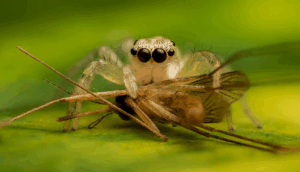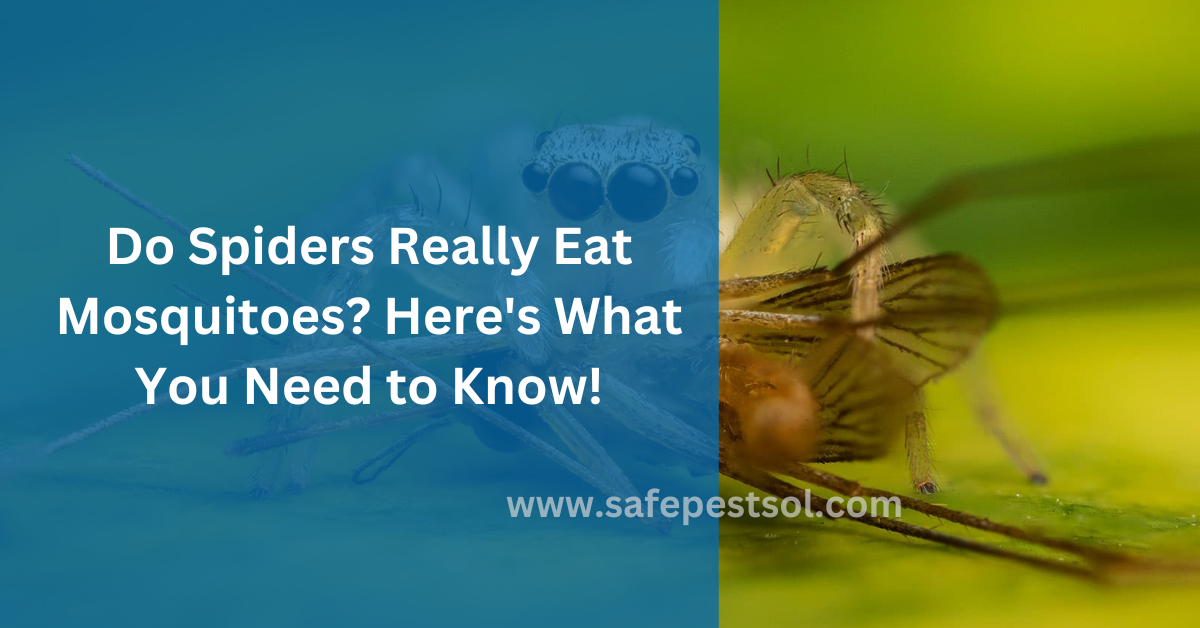Do Spiders Eat Mosquitoes? The Truth Will Surprise You!
For many people, spiders are considered to be creepy creatures that live in webs around corners of houses and wait for their next meal. But do these eight-legged hunters help in controlling mosquitoes? Let’s discover the truth about whether spiders really eat mosquitoes or not and how they are a natural pest control.

Understanding Spiders’ Dietary Habits
Spiders are natural predators that survive on consuming species that they catch. Spider dietary habits mainly consists of different types of insects (including flies, moths, ants, and even cockroaches). Some bigger species of spider can eat some small vertebrates such as frogs or lizards. Some of their species design their web to catch prey while others hunt prey by chasing them.
Do Spiders Actually Eat Mosquitoes?
Yes, many spiders eat mosquitoes when they find one. The average orb weaver can trap several mosquitoes in their webs, which are easily meal for them. Since mosquitoes are smaller compared to other insects, they provide a quick and effortless food source. Some hunting spider species, such as wolf spiders and crab spiders, also consume mosquitoes if they find them within reach.
One of the most interesting spider species is Evarcha culicivora, a jumping spider commonly known as “mosquito terminator.”
What Insects Do Spiders Eat?
Besides mosquitoes, spiders can eat many other insects as well. The most common include: flies, moths, roaches, ants, and cockroaches. Some spiders also eat house spiders if they can find it within their territory. Moreover, they even prey on small vertebrates such as frogs or lizards. For this reason, these insects are very important for balancing the household ecosystem by controlling pest populations.
How Do Spiders Catch Mosquitoes?
Web-building spiders, such as orb weavers, construct intricate webs that trap mosquitoes as they fly by. Once a mosquito gets caught, the spider quickly wraps it in silk before injecting venom to liquefy its insides. Hunting spiders, like wolf spiders, actively stalk their prey and pounce on mosquitoes when they come too close. Some species, such as crab spiders, remain motionless and ambush mosquitoes as they land nearby.
Other Animals That Eat Mosquitoes
Here is the list of animals that eat mosquitoes:
1. Bats
Bats are among the most notable and well-known natural predators of mosquitoes. Although bats eat mostly other insects, they also eat mosquitoes in many areas.
2. Birds
Different bird species typically eat mosquitoes. Some of them are swallows, purple martins, and waterfowl. These birds are considered one of the major factors in natural pest control as they eat both adult and larval stages of mosquito populations.
3. Fish
Different kinds of fish, such as goldfish, guppies, and bass, feed on mosquito larvae inside the water. Among these fishes, the most effective is known as the mosquito fish (Gambusia affinis). This fish helps a lot in controlling mosquitoes in different areas.
4. Frogs and Tadpoles
While most frogs and tadpoles do not primarily feed on mosquitoes, some species, like the green tree frog, have been known to consume mosquito larvae. They also compete with mosquito larvae for food, indirectly controlling their populations.
5. Turtles
The red-eared slider turtle is one of the few turtle species that actively feed on mosquito larvae in stagnant water sources.
6. Dragonflies
Dragonflies, often called “mosquito hawks,” prey on mosquitoes at both their aquatic and adult stages. Although they do not eat enough to eliminate entire mosquito populations, they contribute to controlling mosquito abundance.
Do Spiders Also Eat Plants?
While most spiders are strict carnivores, some species consume small amounts of plant material. Certain jumping spiders have been observed feeding on nectar, pollen, and even sap. However, plant material makes up only a small percentage of their diet, as they primarily rely on live prey for sustenance.
Do Spiders Bite Humans?
Most spiders prefer to avoid humans and do not bite unless provoked. While some bites may cause mild irritation, serious reactions are rare. House spiders, such as black house spiders, pose little to no threat to humans. The presence of helpful spiders in homes actually contributes to natural pest control, reducing the need for chemical solutions.
Types of Spiders That Eat Mosquitoes
Wolf Spiders
These fast-moving hunters actively chase down mosquitoes when they come close. Wolf spiders rely on their excellent vision and speed to capture their prey.
Orb Weavers
Known for their large, intricate webs, orb weavers trap mosquitoes and other insects in their sticky silk threads. Once caught, mosquitoes stand no chance of escape.
Crab Spiders
These spiders do not spin webs but instead camouflage themselves and ambush mosquitoes when they land nearby.
Evarcha Culicivora
This unique jumping spider specifically targets blood-fed mosquitoes, helping reduce mosquito-borne disease risks.
Benefits of Having Spiders in Home
- Natural Pest Control: Spiders help manage pest populations by feeding on flies, moths, roaches, and mosquitoes.
- Reducing Mosquito Numbers: By catching and eating mosquitoes, spiders contribute to natural mosquito control in homes and outdoor spaces.
- Minimizing Harmful Pests: Some spiders prey on more dangerous pests, such as cockroaches, reducing infestations.
- Eco-Friendly Solution: Having spiders in a household reduces the need for chemical pest control methods.
When to Eliminate Spiders in Home
- Venomous Species Present: If dangerous spiders like the brown recluse are found, removal may be necessary.
- Infestation Issues: Too many spiders in one area may indicate an underlying pest problem.
- Allergies or Fear: Some people may experience allergic reactions or severe anxiety due to spiders’ presence.
- Spiders in High-Traffic Areas: Having webs in frequently used spaces can be inconvenient and may require removal.
Ways to Get Rid of Spiders in Home
Here are some effective ways to get rid of spiders:
Essential Oils
Certain essential oils, such as peppermint, act as natural repellents against spiders. Also, you can apply these essential oils for spider bites.
Keeping Areas Clean
Reducing clutter and sealing gaps prevents spiders from establishing their homes.
Removing Webs
Regularly clearing webs discourages spider populations from growing.
Using Natural Repellents
Planting flowers around the house can help deter both mosquitoes and spiders.
Conclusion
Spiders play a vital role in natural pest control, helping to manage mosquito populations and other insects. Their presence in homes is often beneficial, but in certain situations, they may need to be removed. By understanding their habits, we can appreciate the balance they bring to the ecosystem.
FAQs
Do all spiders eat mosquitoes?
Not all spiders actively hunt mosquitoes, but many, especially web-building spider species, trap and consume them.
Can spiders help reduce mosquito-borne diseases?
Yes, certain spiders, like Evarcha culicivora, target mosquitoes that have fed on human blood, reducing disease transmission.
Are house spiders dangerous?
Most house spiders, including black house spiders, are harmless and help with natural pest control.
Call Professionals for Spider Infestation!
When you overlook, spiders may turn into a heavy, uncontrollable infestation. If you are dealing with them, this is the right time to call professional pest control like Safe Pest Sol. Our experts can help you get rid of them permanently!

